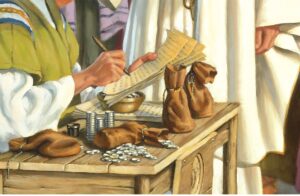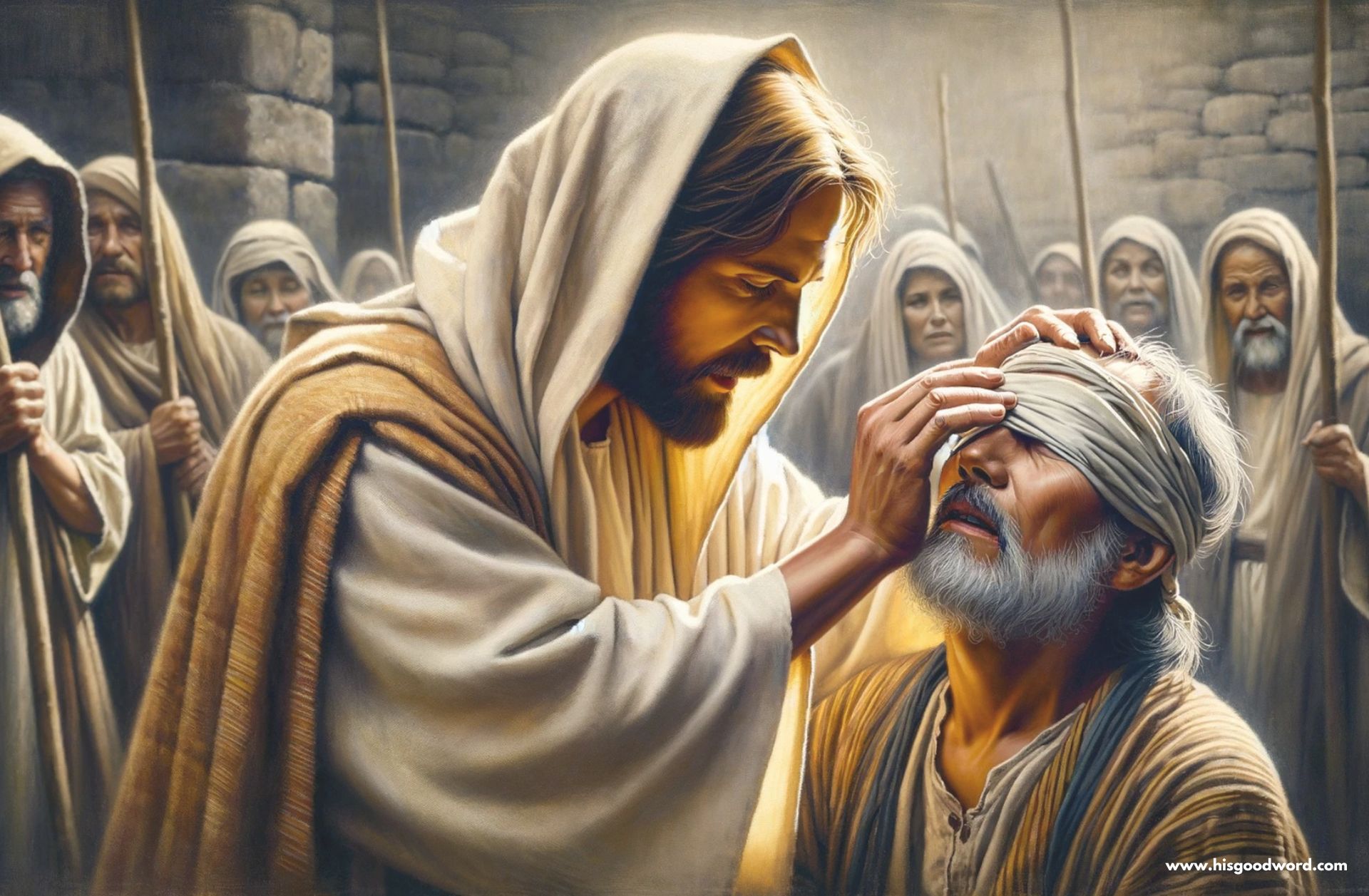Luke 18:1-43 King James Bible KJV

Parable of the Persistent Widow, the Pharisee and the Tax Collector, The Rich Young Ruler, Jesus and the Little Children, Healing of Blind Bartimaeus
Luke Chapter 18:1-43 King James Bible KJV. Luke Chapter 18 contains a series of teachings and parables from Jesus, all of which address key themes such as persistent prayer, humility, faith, and the challenges of wealth in relation to the Kingdom of God. This chapter emphasizes the dependence on God’s grace and encouraging believers to trust in God’s justice, mercy, and power to bring salvation.
- Persistent Prayer and Faith: Jesus teaches the importance of persistence in prayer, showing that God is just and responds to the faithful cries of His people.
- Humility and Justification: The parable of the Pharisee and the tax collector highlights that humility and repentance, not self-righteousness, lead to justification before God.
- Childlike Trust: Jesus calls for a childlike openness and dependence on God, showing that humility is essential for entering the kingdom.
- The Challenge of Wealth: The story of the rich young ruler illustrates the difficulty of serving both God and wealth, and the need for radical commitment to following Jesus.
- God’s Power and Grace: Jesus reminds His followers that salvation is not possible through human effort but only through God’s grace.
- Compassion and Faith: The healing of Bartimaeus shows that those who call out to Jesus in faith will experience His mercy and healing.
Luke 18:1-43 King James Bible KJV
—————-

The Parable of the Persistent Widow – verses 1–8
In this parable, Jesus tells the story of a widow who repeatedly comes to an unjust judge, asking for justice against her adversary. Though the judge neither fears God nor respects people, he eventually grants her request because of her persistence. Jesus contrasts this unjust judge with God, stating that if even an unjust judge responds to persistence, how much more will God, who is just, respond to His people’s prayers. This parable teaches us:
- Persistent Prayer: Jesus teaches that persistence in prayer is vital. Even when answers seem delayed, believers should not give up but continue to pray faithfully.
- God’s Justice: Unlike the unjust judge, God is righteous and will bring justice swiftly for His people. Jesus encourages faith in God’s willingness to respond to the cries of the oppressed.
- Faith in God’s Timing: The closing question (“When the Son of Man comes, will He find faith on the earth?”) implies that maintaining faith and persistence is important, even when answers seem delayed.
The Parable of the Pharisee and the Tax Collector – verses 9–14
This parable contrasts two men who went to the temple to pray. The Pharisee boasts about his righteousness, thanking God that he is not like others, especially the tax collector. He lists his religious accomplishments (fasting and tithing). Meanwhile, the tax collector stands at a distance, beats his chest in sorrow, and prays, “God, have mercy on me, a sinner.” Jesus concludes that the tax collector, not the Pharisee, went home justified before God, because “everyone who exalts himself will be humbled, and he who humbles himself will be exalted.” We learn:
- Humility Before God: This parable illustrates that humility, not self-righteousness, is the key to being justified before God. The tax collector acknowledges his sinfulness, while the Pharisee’s pride and self-satisfaction prevent him from truly seeking God’s mercy.
- Justification by Grace: The message is that we are justified by God’s grace, not by our own works or righteousness. It is those who recognize their need for God’s mercy who are accepted by Him.
- Warning Against Self-Righteousness: Jesus warns against the attitude of spiritual pride that the Pharisee exhibits, teaching that it leads to self-exaltation rather than genuine faith.


Jesus and the Little Children – verses 15–17
People are bringing babies and children to Jesus for Him to bless, but the disciples rebuke them. Jesus, however, welcomes the children and says, “Let the little children come to me, and do not hinder them, for the kingdom of God belongs to such as these.” He adds that anyone who does not receive the kingdom of God like a little child will never enter it. Jesus teaches us:
- Childlike Faith: Jesus teaches that to enter the kingdom of God, one must have a childlike faith—marked by trust, openness, and humility. Children naturally depend on others, and Jesus calls for that same dependence on God.
- Inclusivity in the Kingdom: The kingdom of God is open to all, even the least and most vulnerable in society, such as children.

The Rich Young Ruler – verses 18–30
A rich young ruler comes to Jesus and asks what he must do to inherit eternal life. Jesus responds by listing the commandments, and the young man claims to have kept them all since his youth. Jesus then tells him to sell all he has, give the money to the poor, and follow Him. The man becomes very sad because he is very wealthy. Jesus remarks that it is hard for the rich to enter the kingdom of God, comparing it to a camel going through the eye of a needle. When the disciples ask who then can be saved, Jesus responds that what is impossible with man is possible with God. Peter then points out that they have left everything to follow Jesus, and Jesus assures him that anyone who sacrifices for the kingdom of God will receive many times more in this life and in the age to come, eternal life. We learn:
- Challenges of Wealth: Jesus teaches that wealth can be a hindrance to entering the kingdom of God because it can create a sense of self-sufficiency and attachment to worldly things. The rich young ruler’s attachment to his wealth prevents him from fully committing to God.
- Radical Discipleship: Jesus calls for total commitment to Him, which sometimes requires letting go of material wealth and security.
- God’s Grace: Salvation is ultimately impossible through human effort, but God makes it possible through His grace.

Jesus Predicts His Death for the Third Time – verses 31–34
Jesus takes the Twelve disciples aside and tells them that they are going up to Jerusalem, where everything written by the prophets about the Son of Man will be fulfilled. He explains that He will be handed over to the Gentiles, mocked, insulted, spit on, flogged, and killed, but on the third day He will rise again. The disciples do not understand what He is talking about, as its meaning is hidden from them.
- Jesus’ Mission: Jesus clearly predicts His suffering, death, and resurrection, highlighting that His path involves sacrifice and fulfillment of God’s redemptive plan.
- The Disciples’ Lack of Understanding: At this point, the disciples are still unable to grasp the full significance of Jesus’ mission, showing that divine revelation often comes progressively.


The Healing of Blind Bartimaeus – verses 35–43
As Jesus is approaching Jericho, a blind man named Bartimaeus hears that Jesus is passing by. He cries out, “Jesus, Son of David, have mercy on me!” The crowd tells him to be quiet, but he shouts even louder. Jesus stops, calls him over, and asks what he wants. Bartimaeus asks to see, and Jesus says, “Receive your sight; your faith has healed you.” Immediately, he receives his sight and follows Jesus, praising God. We learn:
- Faith in Action: Bartimaeus’ persistence and boldness in crying out to Jesus reflects the kind of faith that Jesus commends. His faith leads to both physical healing and spiritual transformation as he follows Jesus.
- Jesus’ Compassion: This miracle shows Jesus’ compassion for those who are suffering and marginalized. He stops and responds to Bartimaeus’ plea, despite the crowd trying to silence him.
- Spiritual Sight: Beyond physical healing, the story symbolizes spiritual sight. Bartimaeus’ faith opens his eyes not only physically but also spiritually, leading him to follow Jesus.
Luke 18:1-43 King James Bible KJV
1 And he spake a parable unto them to this end, that men ought always to pray, and not to faint;
2 Saying, There was in a city a judge, which feared not God, neither regarded man:
3 And there was a widow in that city; and she came unto him, saying, Avenge me of mine adversary.
4 And he would not for a while: but afterward he said within himself, Though I fear not God, nor regard man;
5 Yet because this widow troubleth me, I will avenge her, lest by her continual coming she weary me.
6 And the Lord said, Hear what the unjust judge saith.
7 And shall not God avenge his own elect, which cry day and night unto him, though he bear long with them?
8 I tell you that he will avenge them speedily. Nevertheless when the Son of man cometh, shall he find faith on the earth?

9 And he spake this parable unto certain which trusted in themselves that they were righteous, and despised others:
10 Two men went up into the temple to pray; the one a Pharisee, and the other a publican.
11 The Pharisee stood and prayed thus with himself, God, I thank thee, that I am not as other men are, extortioners, unjust, adulterers, or even as this publican.
12 I fast twice in the week, I give tithes of all that I possess.
13 And the publican, standing afar off, would not lift up so much as his eyes unto heaven, but smote upon his breast, saying, God be merciful to me a sinner.
14 I tell you, this man went down to his house justified rather than the other: for every one that exalteth himself shall be abased; and he that humbleth himself shall be exalted.

15 And they brought unto him also infants, that he would touch them: but when his disciples saw it, they rebuked them.
16 But Jesus called them unto him, and said, Suffer little children to come unto me, and forbid them not: for of such is the kingdom of God.
17 Verily I say unto you, Whosoever shall not receive the kingdom of God as a little child shall in no wise enter therein.

18 And a certain ruler asked him, saying, Good Master, what shall I do to inherit eternal life?
19 And Jesus said unto him, Why callest thou me good? none is good, save one, that is, God.
20 Thou knowest the commandments, Do not commit adultery, Do not kill, Do not steal, Do not bear false witness, Honour thy father and thy mother.
21 And he said, All these have I kept from my youth up.
22 Now when Jesus heard these things, he said unto him, Yet lackest thou one thing: sell all that thou hast, and distribute unto the poor, and thou shalt have treasure in heaven: and come, follow me.
23 And when he heard this, he was very sorrowful: for he was very rich.
24 And when Jesus saw that he was very sorrowful, he said, How hardly shall they that have riches enter into the kingdom of God!
25 For it is easier for a camel to go through a
needle’s eye, than for a rich man to enter into the kingdom of God.
26 And they that heard it said, Who then can be saved?
27 And he said, The things which are impossible with men are possible with God.
28 Then Peter said, Lo, we have left all, and followed thee.
29 And he said unto them, Verily I say unto you, There is no man that hath left house, or parents, or brethren, or wife, or children, for the kingdom of God’s sake,
30 Who shall not receive manifold more in this present time, and in the world to come life everlasting.

31 Then he took unto him the twelve, and said unto them, Behold, we go up to Jerusalem, and all things that are written by the prophets concerning the Son of man shall be accomplished.
32 For he shall be delivered unto the Gentiles, and shall be mocked, and spitefully entreated, and spitted on:
33 And they shall scourge him, and put him to death: and the third day he shall rise again.
34 And they understood none of these things: and this saying was hid from them, neither knew they the things which were spoken.

35 And it came to pass, that as he was come nigh unto Jericho, a certain blind man sat by the way side begging:
36 And hearing the multitude pass by, he asked what it meant.
37 And they told him, that Jesus of Nazareth passeth by.
38 And he cried, saying, Jesus, thou Son of David, have mercy on me.
39 And they which went before rebuked him, that he should hold his peace: but he cried so much the more, Thou Son of David, have mercy on me.
40 And Jesus stood, and commanded him to be brought unto him: and when he was come near, he asked him,
41 Saying, What wilt thou that I shall do unto thee? And he said, Lord, that I may receive my sight.
42 And Jesus said unto him, Receive thy sight: thy faith hath saved thee.
43 And immediately he received his sight, and followed him, glorifying God: and all the people, when they saw it, gave praise unto God.
This is His Good Word as written in Luke 18:1-43 King James Bible. Click here to listen to the audio recording of Luke 18:1-43 or click this link to continue on to Chapter 19 of The Gospel of Luke. Peace be with you 🙏
You must be logged in to post a comment.